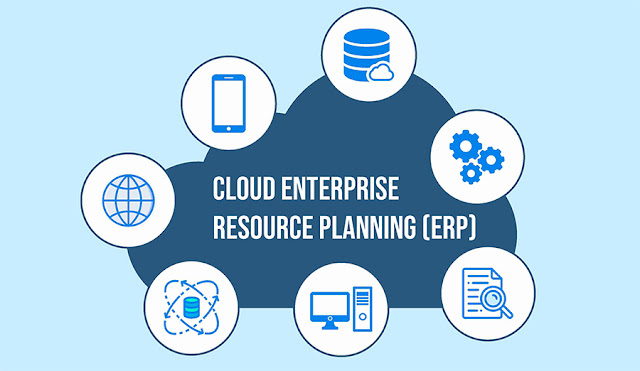Cloud ERP Market Size Observe Significant Surge During 2014–2024
Enterprise resource planning (ERP) has become a critical part of all organizations irrespective of their size. ERP streamlines business processes such as accounting, procurement, human resource, and others, resulting in improved productivity, efficiency as well as collaboration. The traditional ERP systems took longer time to be implemented, required high upfront cost, and ample of hardware, software, and technical expertise. The need for high return on investment (ROI) and lower upfront cost have been major drivers for the growth of cloud ERP market.
BFSI industry was the largest adopter of private cloud deployment in cloud ERP market in 2017, owing to the involvement of sensitive data such as account details of high-income group (HNI), traders’ operations, and other critical data. Since, cloud ERP incorporates both critical and non-critical datasets such as sales data, financials, human resource and others, hybrid deployment model is projected to exhibit fastest growth during the forecast period.
Based on enterprise size, cloud ERP market is classified into small and medium enterprises (SMEs), and large enterprises. Though, legacy ERP systems were popular among large enterprises, cloud ERP recorded an influx of demand from SMEs in recent times. Cloud ERP allow SMEs to access a large number of applications, such as financial management, sales forecasting, without incurring high upfront cost that are associated with traditional on-premises ERP. Implementation of cloud ERP is helping SMEs and start-ups by eliminating huge infrastructure cost, ensuring faster deployment, and rise in business agility, in addition to improving employee efficiency.
Request to Get the Sample Report@ https://www.psmarketresearch.com/market-analysis/cloud-erp-market/report-sample
Globally, North America was the largest revenue contributor to the cloud ERP market in 2017, on account of growing organizational need for improving employee productivity and efficiency, in addition to saving operational costs. Companies in the region are increasingly adopting cloud ERP systems in order to improve collaboration among multiple departments and to manage different applications such as human resource, financials, and supply chain efficiently.
Providing more flexibility to businesses, cloud ERP solutions are predicted to open-up opportunities for the cloud ERP market in developing regions. This can be attributed to the growing digital transformation across the region, particularly in India, Japan, and China, owing the ongoing “Industry 4.0” revolution which is bringing digital transformation in the industry.
The rapid growth in demand for cloud ERP in industries such as healthcare, retail, education and telecom are set to derive the market. Increased penetration of new technology solutions within organizations, low demographic barriers such as mobility, and availability of advanced open source applications with greater efficiency & transparency is also driving the growth of the global cloud ERP market.
Some of the players operating in the Cloud ERP market are Oracle Corporation, SAP SE, Microsoft Corporation, Infor Inc, NetSuite Inc, Sage Group plc, Epicor Software Corporation, IFS AB, Workday, Inc, and IBM Corporation.
BFSI industry was the largest adopter of private cloud deployment in cloud ERP market in 2017, owing to the involvement of sensitive data such as account details of high-income group (HNI), traders’ operations, and other critical data. Since, cloud ERP incorporates both critical and non-critical datasets such as sales data, financials, human resource and others, hybrid deployment model is projected to exhibit fastest growth during the forecast period.
Based on enterprise size, cloud ERP market is classified into small and medium enterprises (SMEs), and large enterprises. Though, legacy ERP systems were popular among large enterprises, cloud ERP recorded an influx of demand from SMEs in recent times. Cloud ERP allow SMEs to access a large number of applications, such as financial management, sales forecasting, without incurring high upfront cost that are associated with traditional on-premises ERP. Implementation of cloud ERP is helping SMEs and start-ups by eliminating huge infrastructure cost, ensuring faster deployment, and rise in business agility, in addition to improving employee efficiency.
Request to Get the Sample Report@ https://www.psmarketresearch.com/market-analysis/cloud-erp-market/report-sample
Globally, North America was the largest revenue contributor to the cloud ERP market in 2017, on account of growing organizational need for improving employee productivity and efficiency, in addition to saving operational costs. Companies in the region are increasingly adopting cloud ERP systems in order to improve collaboration among multiple departments and to manage different applications such as human resource, financials, and supply chain efficiently.
Providing more flexibility to businesses, cloud ERP solutions are predicted to open-up opportunities for the cloud ERP market in developing regions. This can be attributed to the growing digital transformation across the region, particularly in India, Japan, and China, owing the ongoing “Industry 4.0” revolution which is bringing digital transformation in the industry.
The rapid growth in demand for cloud ERP in industries such as healthcare, retail, education and telecom are set to derive the market. Increased penetration of new technology solutions within organizations, low demographic barriers such as mobility, and availability of advanced open source applications with greater efficiency & transparency is also driving the growth of the global cloud ERP market.
Some of the players operating in the Cloud ERP market are Oracle Corporation, SAP SE, Microsoft Corporation, Infor Inc, NetSuite Inc, Sage Group plc, Epicor Software Corporation, IFS AB, Workday, Inc, and IBM Corporation.




Comments
Post a Comment